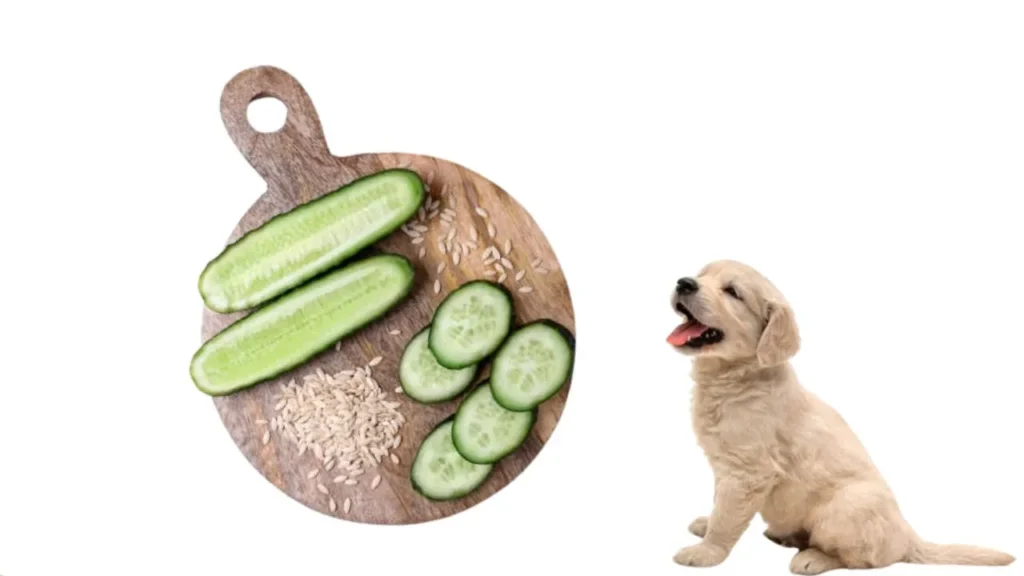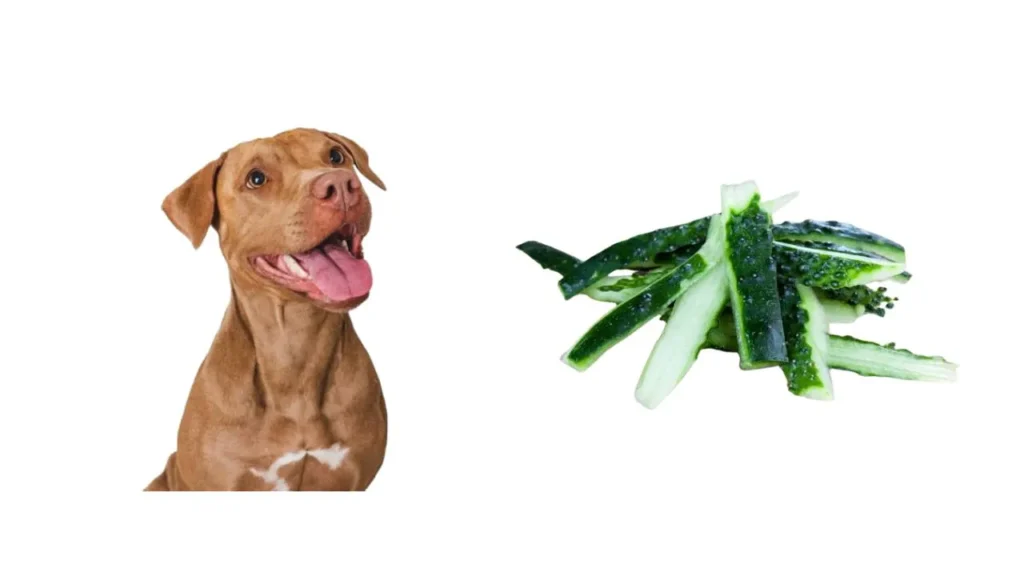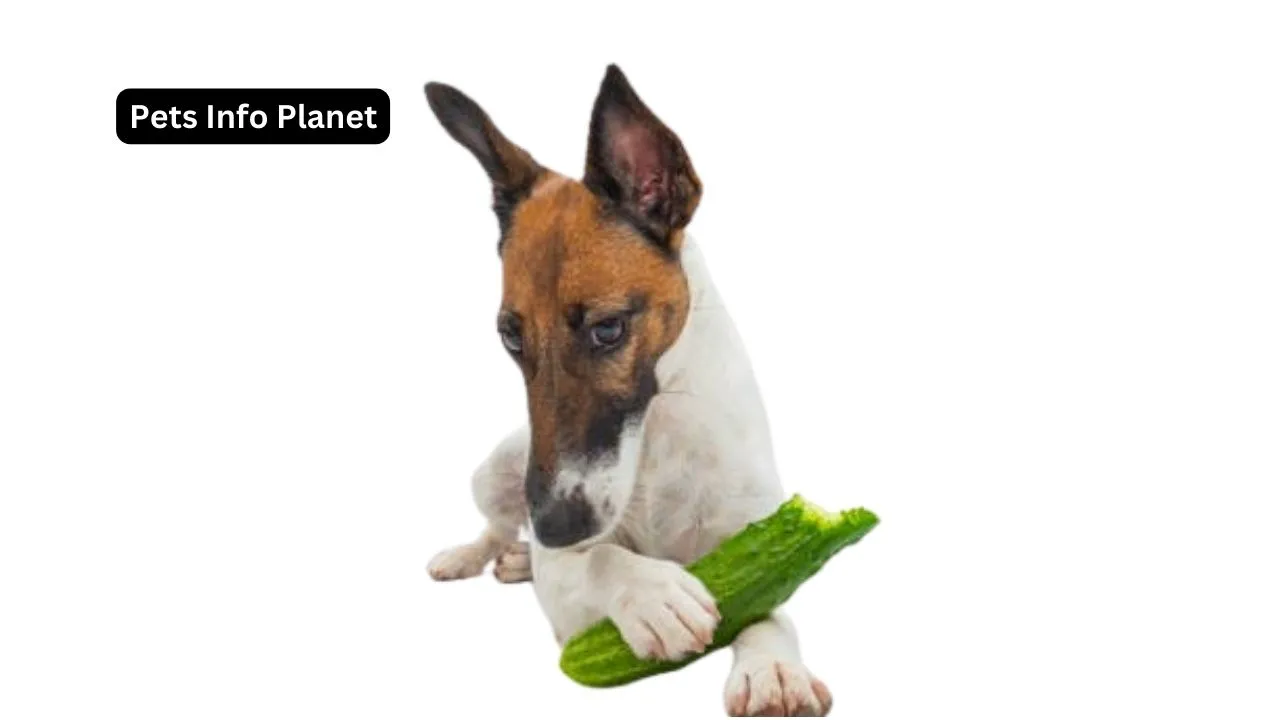Dogs eat cucumbers. As devoted pet enthusiasts, it’s only natural to scrutinize the edibility and nutritional implications of various foods for our beloved canine companions. “Can Dogs Eat Cucumbers” In this exploration, we embark on a culinary journey into the canine world, dissecting the potential advantages and considerations surrounding the incorporation of this raw, green delight into your dog’s diet. Beyond the initial curiosity lies a quest for understanding—addressing safety concerns and unraveling the potential health benefits of sharing cucumbers with your furry friend.
Join us in this informative expedition, where we aim to determine if cucumbers can transcend their human-centric image, emerging as not just a crunchy snack for us but a potentially delightful and healthful addition to your dog’s culinary repertoire.
Can Dogs Have Cucumbers?
Absolutely. Cucumbers can be a nutritious and hydrating addition to your canine companion’s diet. Packed with water content and low in calories, cucumbers make for a refreshing snack that can aid in keeping your dog hydrated, especially during warmer seasons. However, it’s crucial to ensure that the cucumbers are offered in moderation and prepared in a dog-friendly manner—sliced into bite-sized pieces to prevent choking hazards.
Rich in vitamins K, C, and B1, as well as minerals like copper and biotin, cucumbers can contribute to your dog’s overall health. The crisp texture also offers a satisfying chewing experience, promoting dental health by reducing plaque and tartar. As with any addition to your pet’s diet, it’s advisable to consult with your veterinarian to ensure that cucumbers align with your dog’s specific dietary needs and any pre-existing health conditions. In moderation, cucumbers can be a delightful and healthful treat, enhancing your dog’s nutritional intake while keeping tail wags aplenty.
Can Dogs Eat Cucumbers Skin
Certainly, whether dogs can eat cucumber skin warrants careful consideration. The skin of a cucumber is generally safe for dogs to consume, provided it is washed thoroughly to remove any pesticides or contaminants. The skin contains additional fiber, contributing to digestive health and potentially aiding dog weight management. However, moderation is vital, as excessive consumption of cucumber skin might lead to digestive upset or, in rare cases, an allergic reaction.
As with any new addition to a dog’s diet, it’s advisable to introduce cucumber skin gradually and observe your pet for any adverse reactions. Slicing the cucumber into manageable, bite-sized pieces can also help prevent choking hazards. Always consult with your veterinarian to ensure that incorporating cucumber skin aligns with your dog’s specific dietary needs and any existing health considerations. While cucumber skin can offer added nutritional benefits, a balanced and mindful approach ensures it enhances your dog’s diet without compromising their well-being.
Can Dogs Eat Cucumbers Raw
Indeed, dogs can enjoy raw cucumbers as a healthy and hydrating treat. Raw cucumbers are a low-calorie snack that provides dogs with essential vitamins and minerals, including K, C, and B1, along with biotin and copper. The high water content in cucumbers can also contribute to your dog’s hydration, making it an excellent choice, especially during warmer weather.
When offering raw cucumbers to your dog, it’s essential to wash them thoroughly to remove any potential pesticides or contaminants. Additionally, slicing the cucumbers into bite-sized pieces can prevent choking and make it easier for your furry friend to enjoy. While cucumbers are generally safe for dogs, it’s crucial to introduce them in moderation to avoid any digestive upset. As with any dietary changes, consulting with your veterinarian ensures that raw cucumbers align with your dog’s nutritional needs and overall health. When done thoughtfully, incorporating raw cucumbers into your dog’s diet can be a refreshing and nutritious addition.
Can Dogs Eat Cucumbers With Seeds
Feeding dogs cucumbers with seeds is generally considered safe, as the seeds themselves are not toxic to canines. However, it’s essential to be mindful of the quantity. While small amounts of cucumber seeds are unlikely to cause harm, an excessive intake may lead to gastrointestinal discomfort or upset. To mitigate potential risks, you can remove the seeds before offering cucumbers to your dog, ensuring a safer and more digestible treat.
Moderation is vital when introducing cucumbers with seeds to your dog’s diet. Slicing the cucumbers into manageable portions and removing the seeds can reduce the risk of choking and digestive issues. As always, it’s advisable to monitor your dog’s response to new foods and consult your veterinarian to determine the most suitable dietary choices based on your pet’s needs. In conclusion, while cucumbers with seeds can be a healthy addition to your dog’s snacks, responsible portioning, and consideration of your dog’s overall well-being are essential for a positive culinary experience.
Can Dogs Eat Cucumbers Peeled
Indeed, dogs can safely enjoy cucumbers that have been peeled. Removing the skin can make the cucumber more digestible for some dogs and is a suitable option for those with sensitive stomachs. Peeled cucumbers retain their crisp texture and offer a hydrating and low-calorie snack option, rich in vitamins K, C, and B1 and beneficial minerals like biotin and copper.
When offering peeled cucumbers to your dog, it’s crucial to ensure they are free from pesticides or contaminants by washing them thoroughly. Slicing the cucumber into bite-sized pieces promotes safe consumption and helps prevent choking. As with any new addition to your dog’s diet, moderation is vital to avoid potential digestive upset. If you have concerns or questions about incorporating peeled cucumbers into your dog’s meals, consulting with your veterinarian can provide personalized guidance based on your pet’s dietary needs and health considerations. Peeled cucumbers can be a refreshing and nutritious treat for your canine companion when introduced responsibly.
Are Cucumbers Good For Dogs
1.Nutritional Bounty:
Cucumbers are a nutritious and hydrating option. T in the quest to provide our canine companions with wholesome treats, crisp vegetables bring many benefits to your dog’s diet, boasting vitamins K, C, and B1, as well as essential minerals like biotin and copper. With a low-calorie profile, cucumbers offer a guilt-free indulgence while contributing to hydration, making them a refreshing choice, particularly in warmer climates. Understanding the nutritional bounty of cucumbers is critical to appreciating their potential positive impact on your dog’s overall health.
2.Safety and Moderation:
While cucumbers are generally safe for dogs, responsible feeding ensures a positive culinary experience. Washing cucumbers thoroughly to remove pesticides, considering the removal of seeds to prevent digestive issues, and slicing them into bite-sized portions help mitigate potential risks. Moderation is crucial to avoid any gastrointestinal upset. As with any dietary changes, consulting with your veterinarian is advisable to tailor the introduction of cucumbers to your dog’s specific health needs. By incorporating cucumbers mindfully, you can give your dog a tasty treat and a nutritionally beneficial addition to their diet.
Are Cucumber Plants Toxic to Dogs
1.Understanding the Risk:
Cucumber plants, while not inherently toxic to dogs, contain compounds like cucurbitacins that can lead to digestive discomfort if ingested in large quantities. Pet owners need to comprehend the potential risks associated with these compounds to ensure the well-being of their canine companions.
2.Recognizing Symptoms:
Instances of dogs consuming cucumber plants are infrequent, but vigilance is crucial. Recognizing signs of ingestion, such as vomiting, diarrhea, or signs of abdominal distress, is paramount. Immediate veterinary attention is advised if any of these symptoms manifest. Early intervention can prevent complications and address any adverse effects promptly.
3.Promoting a Safe Environment:
Proactive measures can be taken to maintain a pet-friendly space. Monitoring outdoor activities, discouraging excessive plant consumption, and implementing physical barriers like fencing or plant pots are effective preventive measures. Offering a balanced diet and suitable chew toys also reduces the likelihood of dogs seeking alternative, potentially harmful, plant-based sources. By adopting these practices, pet owners can create an environment where their dogs enjoy a safe and enriching experience without encountering unnecessary health risks.
Read More
Can Dogs Eat Carrots? Full Guide in 2024
Can Dogs Eat Cantaloupe :Best Guide For Dogs Feeding
Can Dogs Eat Shrimp: Read Before You Feed
Conclusion
In conclusion, exploring whether dogs can eat cucumbers unfolds as a comprehensive guide for responsible pet owners. The nutritional benefits of cucumbers, both in their raw form and when peeled, highlight their potential as a hydrating and low-calorie treat for dogs. Examining cucumber seeds underscores the importance of moderation in canine diets, emphasizing responsible portioning to prevent potential digestive issues.
Furthermore, the discussion about cucumber plants elucidates the need for vigilance in maintaining a safe environment for dogs, offering insights into potential risks and symptoms associated with plant ingestion. Overall, the overarching theme is responsible feeding practices, ensuring that dogs can enjoy the delights of cucumbers in a manner that enhances their well-being without compromising their health. Pet owners are encouraged to incorporate cucumbers thoughtfully, consider individual preference moderation, and consult with veterinarians to tailor dietary choices to their canine companions’ needs.

